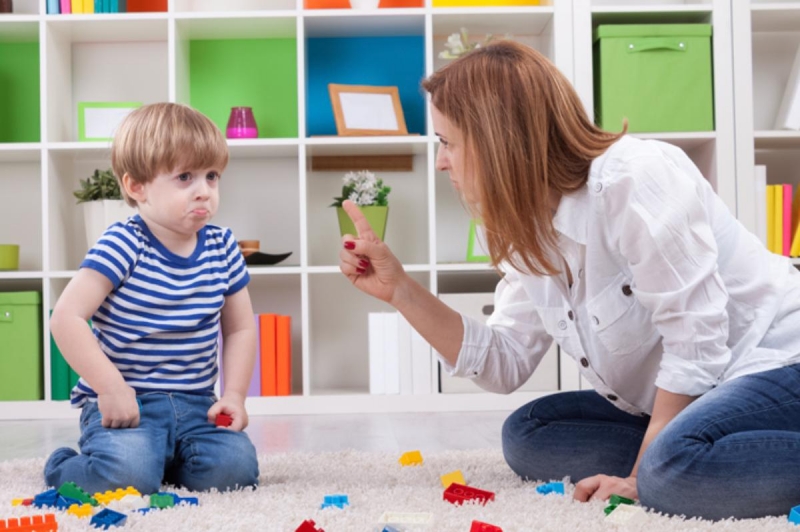The word "no", like the particle "not" is perceived by our subconscious, often on the contrary, as if programming us to do everything not as requested. Children are even more prone to this effect. When sending a child to the store for bread, one should not say: “Do not forget to buy more milk”, as most likely the child will receive the message "not." Simply say: "Buy more milk." If you tell your child: “Do not take the scissors!”, Most likely, he will want to take them. How important it is for parents to learn to prohibit without prohibiting. How to do it? How to stop using statements in a negative way?

Exciting game “Hour without prohibitions”
The essence of the game is that for an hour the mother dispenses with the words "no", it is impossible "and the particles do not." To begin with, it’s worth explaining the rules to the baby - mom does not prohibit anything, and you behave yourself well. “Today we have an hour without prohibitions. Do you know how to behave? I can’t forbid you anything, but you, in turn, show how old you are. I will do my adult business, and you will do my own ”. Kids will definitely like this game, because now, as it may seem to him, he is free to do whatever he wants without risking being punished.
Most likely, the child will be interested in this hour, he can really behave well, but he can also check his parents whether you are forbidden to forbid by deliberately creating situations in which you can’t do without a ban, - walk along the edge of the bed, for example. What to do in this case, because you promised to do without the "impossible"? Nothing prevents you from commenting on the child, saying that doing so is dangerous. You can run up to him with a frightened look to hedge. Tell the baby that you were very scared for him. The kid himself will understand why you were not allowed to do this before.because you are afraid for him and want to save him from trouble. This approach is positive, and a direct prohibition is always perceived negatively.
It's time to practice a day without prohibitions
When the first game begins to bear fruit, gradually move to the day without prohibitive phrases. This does not mean that now everything is allowed to the baby - father and mother have the right to make comments and pay attention to the wrong actions of their children. The main thing is to do it right without using the particle “not” and the word “impossible”. How is this possible?

Suppose a son returns from class an hour after completion, and usually the journey home takes 30 minutes. Naturally, the parents began to worry. The first thing that can break out is: “Why didn't you get home on time?” By asking so, you break the rules of your own game. Try rebuilding the phrase so that there is no “no” particle in it. Ask the child: “Why did you linger?” or "Where have you been?" Ask him to come home next time after class or to warn him to visit a friend: “The next time you linger, call and say where and with whom you want to go. Just that I would know and be calm ”. So you made a remark, explained that you don’t have to do this (according to the rules of the game), and made it clear that you are worried and remember that he did not arrive on time. The child must also understand that this is not a day of permissiveness.
The absence of prohibitions in the words of parents does not mean complete freedom of action and impunity, this is exactly what the baby should learn. When adults do not use the words “no” and “not,” parenting does not provoke protest in children at the psychological level, but rather encourages them to do things, which will be followed by the praise of their relatives. In fact, the kids like to be good and delight loved ones if they are not forced to do it. It will take about one month to create a new habit of doing without prohibitions; in the future, almost all comments will be easy for you to pronounce in a positive way.
Constantly improve the skill of not prohibiting

In order not to lose the skill of positive instruction, you need to regularly include yourself and children in the gameplay. Children will definitely enjoy the game, according to the rules of which all family members exclude certain words from use. If you try not to utter some words throughout the day, for example, “yes,” “no,” “white,” or “black,” and in the evening reward the winner and fine the loser, the older children will be delighted. To see clearly who how many times misfired, set small containers for each player. In them you will add penal papers - whoever has more of them will lose.
As a punishment for using forbidden words in speech, you can ask to squeeze several times from the floor, wash dishes, eat lemon. Penalties should not be derogatory or impracticable. Do not leave the winner without encouragement - then the next time he will make even more efforts to win. Such a game can relieve bad mood and bring family members together, so practice it more often. As a result, everyone will be able to learn to control their speech, and this is useful for both parents and children.
We also read: 5 alternatives to the word “NO”
What to do if it is impossible to do without a ban?
There are situations when it is not possible to exclude a ban on some action. What to do then? In this regard, it is better to use some of the rules outlined below.
- If you say “no” to your child, be sure to accompany him with a detailed explanation of the reasons. Children who understand why they are not allowed to do a particular act more easily follow parental guidance. We also read: how to say “no” to the child.
- Do not use the prohibitions too often, only if necessary. At the same time, discuss possible exceptions to the rules with the children. For example, a schoolchild should not leave the yard, from the visibility zone of his mother, but if you still need to visit a friend, you need to warn adults about this.
- Try not to use the contradictions that are important for physical and mental development: "do not run", "do not jump", "do not shout", or be interested in something else.
- Never use an ordered tone in the treatment of children and do not set conditions, this will cause a backlash and irritation. A suitable form for prohibitions is friendly explanatory.
- When introducing restrictions for children, be sure to stipulate and coordinate them with other family members so that the opinions of parents coincide. Otherwise, the child will manipulate you.
To make the child learn to more easily accept parental parting words, and also to avoid unnecessary conflicts with him, take note of a few more useful tips.
- When forbidding children to something, follow your own rules yourself - do not do what is forbidden to them;
- Keep away objects that the child should not touch - needles, knives, scissors, medicine. Taking these things out of the sight of the baby, you do not have to prohibit touching them;
- Try to use less words - "so it is necessary", "you must", pronounce phrases so that they are easy to perceive psychologically. For example, instead of saying: “You have to eat all the porridge”, say this: “Children who eat everything become strong and healthy”;
- When the baby refuses to do what he does not want, give him a choice, and not confront him with a fact. For example, he does not want to gather on the street, then do not say directly: “We will go for a walk”, and ask his opinion - will you go to the park or to the playground? Kids like to make decisions. Having made his choice, the child will willingly go for a walk. This psychological technique allows mom to achieve what she wants without putting pressure on the baby.
Be wise, find the right approach to your children, get rid of negative phrases and prohibitions. Soon you will see the result - it will be much easier to cope with once uncontrollable tomboys.
We also read:
- how to refuse a capricious child? How to tell the child: “No”?
- what can and should not be forbidden to a child
How to prohibit a child without prohibiting - a child psychologist Julia Milovanov talks about this in the program “Everything is much easier” with her constant host Rina Korchminsky:









I rarely forbid a child, I usually always say that this is not necessary, because bad things can happen. No special problems have arisen.
But looking at other children, I began to prepare.
We also went through this, the most important thing for me was to calmly respond to tantrums and screams, then learn to say “no” in a neutral tone without squeals and indignation. Gradually, we came to an understanding with my son, I often told him stories in which there was a bad and good boy, and how they acted. He wanted to be good, and so gradually we came to an understanding.
Great idea, “an hour without bans”, I’ll take advantage of it!